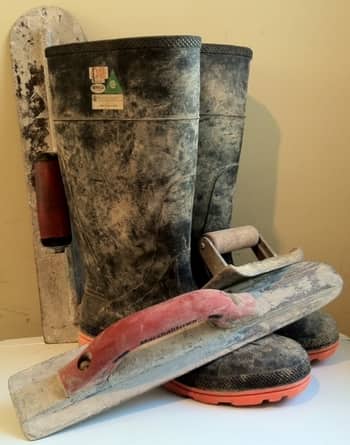Best rubber boots for concrete work
If you’re in the construction business then you probably know a lot about concrete and the process of placing and finishing it.
Concrete is one of the most used products in construction today. It has many different uses, from walkways to curbs to full on massive structural buildings and bridges.
This material has been around for a long time, dating back to 6500BC. The mixture has obviously changed from then into what we have today. However, ancient Egyptian and Roman Empire structures still stand to this day.
They say the strength of concrete used during the Roman Empire time period is as strong as modern day Portland cement, however the Romans did not reinforce their concrete like we do today for maximum strength.
The mixture today is a very potent mix of chemicals that when mixed together creates a highly compressive strength. There is plenty of different mixes for different applications depending on the project you have on the go. However, with all that strengthening that needs to happen, it takes a fair bit of different chemicals to make concrete cure.
Some of the chemicals added to the mix are:
- Corrosive Inhibitors: To help against the start of corrosion to the reinforced metal steel
- Bonding agents: Help bond new and old concrete
- Accelerators: Speeds up the hardening process and is used during the colder weather to speed up the finishing process
- Retarders: The opposite to accelerators, they slow down the process in concrete pours that are large and need more time to finish before the floor finishing starts
- Defoamers: Are added to the mixture when too much air has been added to help make the extra air rise to the surface of the concrete and dissipate
- Pigments: Can add different colour to the concrete and come in many different colour options
- Plasticizers: Are added to help with the workability of the concrete
- Pumping Aids: Helps the pump truck place the concrete
One thing is for certain, when you’re placing concrete, you’re going to want to be wearing the best possible boots during the pour, along with the other regular safety gear.
Your trusty old work boots won’t stand a chance against the chemicals in wet concrete – and neither will your feet. I’ve personally seen some guys pour concrete in their work boots one day, and then the next they have concrete burns on their feet from the chemicals. That’s something you never want to experience, ever.
Concrete poisoning is not something to fool around with. If not treated properly it can lead to other major health issues and possibly an amputation due to complication from the burns. And there’s always the possibility of it getting into your blood stream.
Regular rain boots won’t cut it, either, for pouring concrete. You really should invest in a pair that will last and not break down from the chemicals of wet concrete. Look for a industry approved boot that has the safety tags right on the boot.
You will see the difference between a normal pair of rain boots compared to a proper industry-approved pair of steel-toed rubber boots, because of the quality and safety tags. They will also be steel-toed with a heavy duty rubber sole and possible steel shank, and be a lot taller.
Because of the extra height, I found that while pouring concrete everyday it can start to cause chaffing from the rim of the boot rubbing the skin on the shins. Folding down the tops of the boot and wearing a tall sock helped with that discomfort. Also, taking out the factory insole and adding an aftermarket one will make a huge difference for the comfort of your feet, if you choose to buy a cheaper pair of boots.
My recommendation for the best work boots for pouring concrete is the Servus XTP 15’’ PVC Chemical – Resistance Steel-Toe Men’s Work Boot.
Also, I believe that they come in other colours if you want something other then black. I wouldn’t look at buying a cheaper boot to save money when working with concrete due to the safety and health issues that can occur.
Look at it this way – if you pay more for a good boot, chances are that it will last a lot longer. Just be sure to properly wash it off after every concrete pour. This will put extra money in your pocket because you won’t have to take time off work due to concrete burns on your feet. And isn’t more money in the pocket what we all want in the long run.
